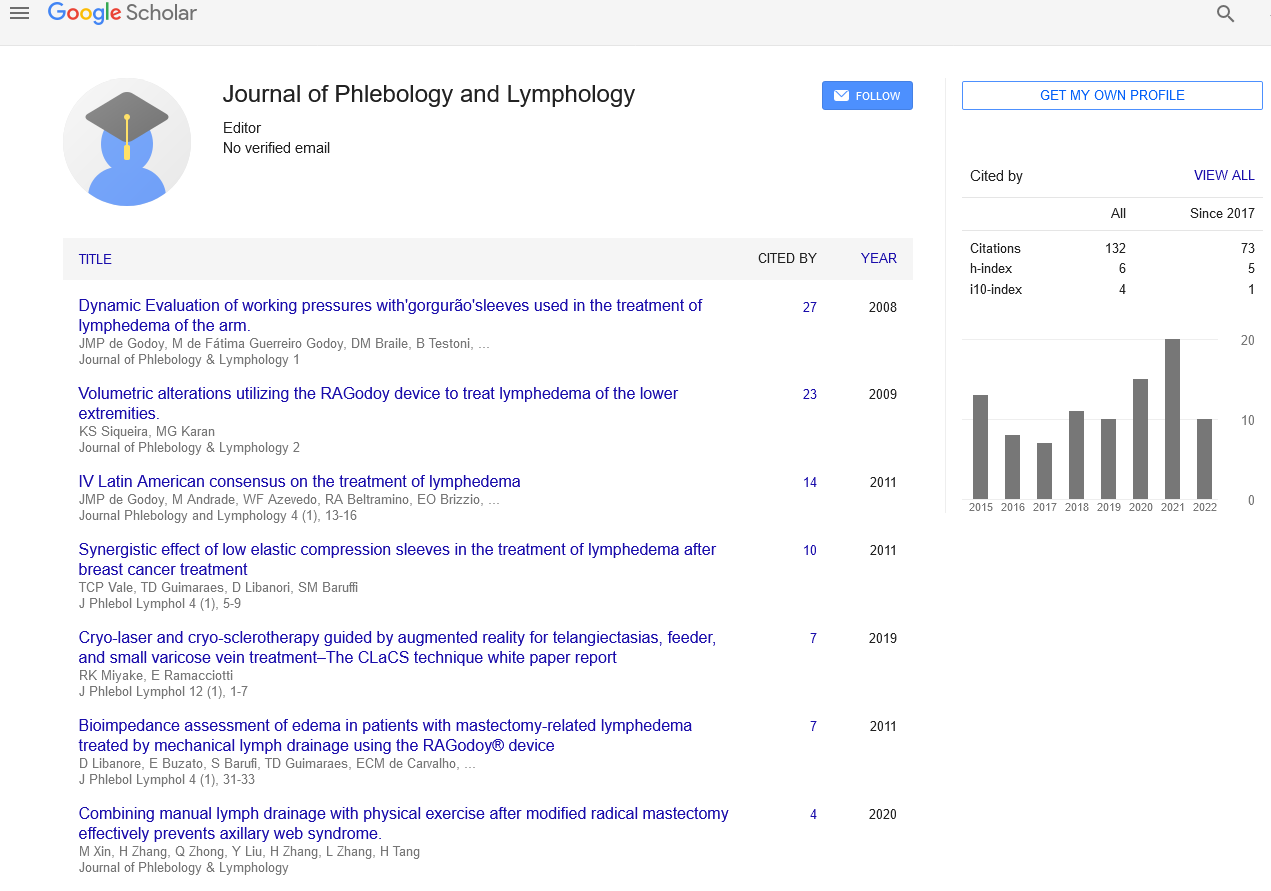Lymphatic dysfunction in cancer
Received: 06-Aug-2023, Manuscript No. puljpl-23-6816; Editor assigned: 08-Aug-2023, Pre QC No. puljpl-23-6816 (PQ); Accepted Date: Aug 25, 2023; Reviewed: 23-Aug-2023 QC No. puljpl-23-6816 (Q); Revised: 26-Aug-2023, Manuscript No. puljpl-23-6816 (R); Published: 29-Aug-2023
Citation: Lee H. Lymphatic dysfunction in cancer. J Phlebol Lymphology. 2023; 16(3):01.
This open-access article is distributed under the terms of the Creative Commons Attribution Non-Commercial License (CC BY-NC) (http://creativecommons.org/licenses/by-nc/4.0/), which permits reuse, distribution and reproduction of the article, provided that the original work is properly cited and the reuse is restricted to noncommercial purposes. For commercial reuse, contact reprints@pulsus.com
Abstract
Lymphatic dysfunction plays a critical role in the progression of various cancers. The lymphatic system is intricately involved in immune
surveillance, tissue homeostasis, and fluid balance. In cancer, lymphatic vessels can undergo structural and functional alterations, facilitating tumor metastasis. This article provides an overview of lymphatic dysfunction in cancer, its impact on disease progression, and potential therapeutic approaches targeting the lymphatic system.
Key Words
Lymphatic system; Cancer; Lymphatic vessels
Introduction
The lymphatic system, a vital component of the circulatory system, is responsible for maintaining tissue fluid homeostasis, immune cell trafficking, and lipid absorption. Lymphatic vessels transport lymphatic fluid, a clear fluid containing immune cells, proteins, and other essential molecules, throughout the body. Lymph nodes, part of the lymphatic system, play a crucial role in filtering and monitoring lymphatic fluid for foreign substances, pathogens, and cancer cells. Lymphatic dysfunction can occur in various pathological conditions, including cancer, and can significantly impact disease progression.
Cancer is a complex disease characterized by uncontrolled cell growth, invasion of surrounding tissues, and potential spread to distant sites, known as metastasis. The lymphatic system serves as a common route for cancer cells to disseminate to regional lymph nodes and distant organs. Cancer cells can invade lymphatic vessels, leading to the spread of the disease via the lymphatic system. Lymphatic dysfunction in cancer involves structural and functional alterations in lymphatic vessels and nodes, contributing to tumor progression and metastasis. These alterations encompass abnormal lymphangiogenesis, lymphatic vessel dilation, impaired lymphatic drainage, and the development of lymphedema.
Abnormal lymphangiogenesis, the formation of new lymphatic vessels, is a hallmark of lymphatic dysfunction in cancer. Tumor cells can secrete growth factors and cytokines that stimulate the growth of lymphatic vessels within and around the tumor,providing a conduit for cancer cell dissemination. Furthermore, cancer-associated lymphatic vessels can exhibit increased permeability, allowing tumor cells to enter the lymphatic system more easily. Once cancer cells have entered the lymphatic vessels, they can travel to regional lymph nodes and subsequently spread to distant organs, significantly worsening the prognosis for patients.
providing a conduit for cancer cell dissemination. Furthermore, cancer-associated lymphatic vessels can exhibit increased permeability, allowing tumor cells to enter the lymphatic system more easily. Once cancer cells have entered the lymphatic vessels, they can travel to regional lymph nodes and subsequently spread to distant organs, significantly worsening the prognosis for patients.
Conclusion
Understanding the role of lymphatic dysfunction in cancer is critical for developing effective therapeutic strategies. Targeting the lymphatic system holds promise in inhibiting tumor progression and metastasis. Therapeutic approaches focused on modulating lymphangiogenesis, improving lymphatic drainage, and addressing lymphedema may prove beneficial in controlling cancer spread and enhancing the overall treatment outcome. Future research should continue to explore novel strategies targeting lymphatic dysfunction to improve cancer prognosis and patient survival.





